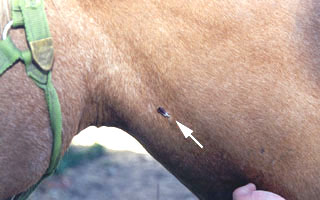
| Drawing blood for a Coggins Test (the arrow identifies the hub of a needle filled with blood). |
BUY THIS MANUAL NOW and have access to this article and 100's of others just like it!
View some of the 10+ Video clips found in the Equine Manual
Causative Agent:
EIA is a viral disease that infects horses, mules, and donkeys.Clinical Signs: The early signs of disease include fever, lethargy, and small hemorrhages of the gums and vulva. As the disease develops into the more chronic stages, the horse may have anemia, swelling of limbs and body, weight loss, and more severe hemorrhages. With time, most of the above signs diminish and many horses become chronic carriers.
Disease Transmission: The virus is transmitted through the direct transfer of infected blood. This can occur when insects (mosquitoes, horse flies, stable flies, and deer flies) feed. Some evidence suggests that the virus can also be spread through needles, equipment, blood transfusions, and even in the mare’s milk.
Diagnosis: Specific diagnosis of this disease is done by collecting a blood sample and running a Coggins test. This test detects antibodies to the EIA virus.
Treatment: There is no effective treatment for the disease.
Prevention: State and Federal laws require Coggins tests for interstate travel. Any positive horse must be reported to the state veterinarian. Depending on the state, any positive animal must be euthanized or kept in complete isolation from other horses or insects. Contact your state veterinarian for more specifics.

|
|
BUY THIS MANUAL NOW and have access to this article and 100's of others just like it!
View some of the 10+ Video clips found in the Equine Manual